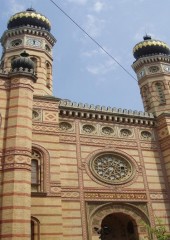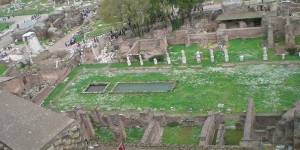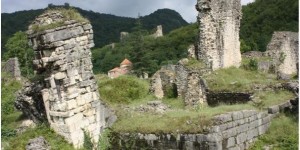The 11th Annual meeting of the British Association for Biological Anthropology and Osteoarchaeology was held in Bradford between the 18th and the 20th September 2009. This was not only my first time attending BABAO, but my first time attending an archaeological conference.
This year, for the first time, the BABAO conference was preceded by a two day dental anthropology short course, hosted by Alan Ogden and Julia Beaumont of the Biological Anthropology Research Centre, University of Bradford, between the 16th and 17th of September. Unfortunately for me my measly student budget couldn't cover both the conference and the short course so I missed the first two days and was only present from Friday until Sunday.
The keynote lecture to lead us into Friday's session was given by Mike Parker Pearson, who spoke about his ongoing work at Stonehenge (a subject close to any archaeologists heart, after all!), starting with the progress made so far on the 'Beaker People Project' and finishing by providing some insights into his upcoming research, the 'Feeding Stonehenge Project'. Sunday morning and the final keynote lecture was delivered by Keith Manchester, who freely admitted that his granddaughter has prepared his PowerPoint presentation for him, and whose talk was peppered with interesting anecdotes from his career as a GP. This was my personal favourite lecture of the conference, detailing various Palaeopathological conditions such as Leprosy, Venereal Syphilis and Tuberculosis, and discussing the pathological changes seen both in the living and in the bones studied by osteoarchaeologists long after death.
Lectures and talks given at the conference were wide ranging in regards to focus and topic of discussion. For example, Friday's talks included forensics, weapon-related trauma, prehistoric burial mounds and Chris Knüsel's very own Sherlock Holmes-esque investigation into the identity of the 'St. Bees lady'. Saturday saw a shift to studies involving isotopic analysis, biomechanics, bone mineral, and DNA. One notable exception to this was a talk regarding a new computer software programme designed to make the recording and subsequent analysis of human skeletal remains easier and more accurate. Sunday was largely concerned with pathology but touched briefly on warfare and violence, infant mortality, and some unusual dentition from the London based St Bride's crypt assemblage. The final session of the 2009 conference was delivered by Jelena Bekvalac of the Centre for Human Bioarchaeology, Museum of London, who presented a somewhat comical tribute to Bill White (Head Curator of the Centre for Human Bioarchaeology, Museum of London), who retires this month.
One of the 'extra-curricular' events of the BABAO conference is the conference dinner, which this year was an Indian buffet held at the Aagrah restaurant, Thornbury, and which was definitely a lot of fun. After the meal, Alan Ogden hosted his annual BABAO pub quiz, with each table of 10 conference attendees making up a team. Bill White's team won (something of a tradition, I'm lead to believe) and were rewarded with a bottle of champagne.
This year saw Holger Schutkowski step down from his position as chair of BABAO, along with Simon Mays resigning from the position of 'Member from a Professional Organization'. Dr. Jacqueline McKinley of Wessex Archaeology now holds the position of 'Member from a Professional Organization' and, following an online election held prior to the conference, Chris Knüsel is the new chair of the society.
The 12th Annual meeting of the British Association for Biological Anthropology and Osteoarchaeology will be held at the Leverhulme Centre for Human Evolutionary Studies in Cambridge and the provisional dates for this are Friday 17th to Sunday 19th September 2010. Hopefully I'll see some of you there next year...## 'Top Tips' for attending your first conference
- One of the key things I learnt from attending the BABAO conference this year is that conferences are almost as much about meeting people and making contacts as they are about the lectures, talks and poster presentations. From a student's perspective, the people you meet at conferences could turn out to be a great help to you. For example, you may meet someone who could help you with your dissertation, or someone who's taken the Masters degree course you're interested in. Therefore it's a good idea to be as sociable as you can be while you're there and talk to as many people as possible.
- Stay at a hotel recommended by the conference organisers. This has multiple benefits, especially if - like I did - you choose to go to a conference on your own. Most importantly it ensures that you stay somewhere reputable, so you know that both you and your belongings are safe. However on the social side, it gives you a good chance of meeting other people who are also attending the conference.
- If you are staying in a hotel with other conference people and they walk to the venue, walk with them. Not only is this a further chance to get to know people, it's also cheaper than a taxi and possibly safer. However, if you do choose to get a taxi, make sure you get the number of a recommended company from the people at hotel reception.
- Go to the conference meal! It might be included in the conference price or it might be a little bit extra - either way, it's definitely worth it. For one thing this takes the hassle out of trying to find somewhere to eat that night, and for another it's (you guessed it) another chance to meet new people!
- Last but not least, a society related comment rather than a conference comment. The issue of posting questions on a society mailing list came up at the BABAO Annual General Meeting. The outcome of the discussion can be summarised as this: if you post a question to a society's mailing list, it is considered good etiquette to explain who you are, where and at what level you're studying, and why you want to know the answer to the question you're asking. Furthermore, if you get replies to your question, it's generally appreciated if you send an individual reply to the sender to thank them for their time and effort. Also, when you've received all the replies you think you'll get to your question, it's expected that you will collate the information and post this to the mailing list for all to see if they so wish.








